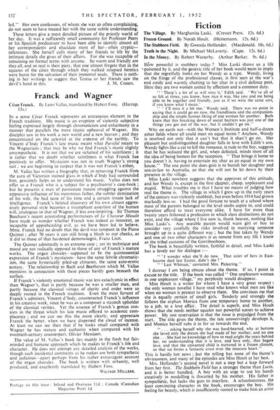Franck and Wagner
Cesar Franck. By Leon Vallas, translated by Hubert Foss. (Harrap. 15s.)
IN a sense asar Franck represents an extraneous element in the French tradition. His music is an eruption of violently subjective feeling expressed largely through chromaticism and enharmony in a manner that parallels the more titanic upheaval of Wagner. His disciples saw in his work a new world and a new heaven ; and they concentrated on the celestial at the expense of the earthly. To Vincent d'Indy Franck's late music meant what Parsifal meant to the Wagnerians ; that may be why we find Franck's music slightly unsympathetic. It is not that we are sickened of his saintliness ; it is rather that we doubt whether saintliness is what Franck has positively to offer. Mysticism was not in truth Wagner's strong suit ; we are beginning to suspect that it was not Franck's either, M. Vallas has written a biography that, in removing Franck fr'om the aura of Victorian stained glass in which d'Indy had surrounded him, genuinely helps us to understand his music. Vallas does not offer us a Franck who is a subject for a psychiatrist's case-book ; but he presents a man of passionate nature struggling against the oppressive influence of his monstrous father, the subtler domination of his wife, the bad taste of his time and a certain innate lack of intelligence. Franck 's belated discovery of his own almost aggres- sively personal style becomes a triumphant assertion of the human will, analogous to that of Wagner, if less awe-inspiring. - Sir Thomas Beecham's recent astonishing performances of Le Chasseur Maudit have made us wonder whether Franck was indeed as innocent, as incapable of apprehending evil, as we have been led to believe. Mme. Franck had no doubt that the devil was rampant in the Piano Quintet ; after 70 years it can still bring a blush to our cheeks, as it did to those of that hardened demonologist, Franz Liszt.
The Quintet admittedly is an extreme case ; yet its technique and mood are not radically opposed to those of any of Franck's mature works. The organ chorales—supposed to be the quintessential expression of Franck's mysticism—have the same febrile chromatic- ism, the same hysterically piled-up climaxes, the same auto-erotic ecstasy. The relationship to Bach and Beethoven which M. Vallas mentions in connection with these pieces hardly goes beneath the surface.
If Franck's violently emotional music was less cataclysmic in effect than Wagner's, that is partly because he was a smaller man, and partly because the classical virtues of clarity and order were so deeply rooted in the French tradition. Even the most fervent of Franck's admirers, Vincent d'Indy, counteracted Franck's influence in his creative work, since he was as a composer a staunch upholder of the classical verities. Yet the essence of Franck's genius con- sists in the threat which his late music offered to academic com- placency ; and we can see this the more clearly, and appreciate Franck the better, when we have dispersed the cloud of incense. At least we can see then that if he looks small compared with Wagner he has stature and authority when compared with his twentieth-century counterpart, Olivier Messiaen.
The value of M. Vallas's book lies mainly in the fresh but fair- minded and humane approach which he makes to Franck's life and character. He does not attempt any detailed analysis of the works, though such incidental comments as he makes are both sympathetic and judicious—apart perhaps from his rather extravagant account of the organ chorales. The book is written with urbanity, well produced, and excellently translated by Hubert Foss.
WILFRID MELLERS.


































 Previous page
Previous page